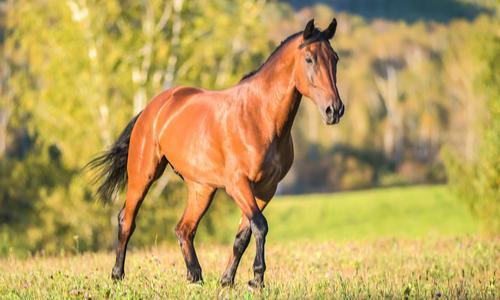
How Much Exercise Does a Senior Horse Need?
Activity is just as important for older horses as it is for younger equines. In fact, regular exercise is crucial for good health and strong bones and muscles.
Exercise Needs Vary Depending on the Horse
Exercise needs depend on your horse's age and fitness level. An 18-year-old horse may be able to handle exercise more easily than a 23-year-old, but that's not always the case. A horse that has spent years competing in shows may be in better condition than a less active younger horse.
Generally, older horses benefit from exercising at least two to three times a week. Exercise should be in addition to turnout time.
Why Exercise Is So Important
Declining muscle mass and a lifetime of wear and tear on joints, ligaments, and tendons can cause pain and stiffness and increase the risk of injury. The longer your horse remains inactive, the harder it may be to move easily. Exercise sessions keep muscles and joints strong and limber and can help prevent or reduce muscle, joint, and arthritis pain.
Exercise also plays a role in heart health and helps your horse maintain a healthy weight. Gaining too much weight can stress the heart and lungs, and increase the likelihood of joint issues or laminitis. Regular activity prevents excess weight gain and reduces the risk of arthritis and other joint problems and may even help your horse avoid colic. Horse&Rider notes that exercise also boosts blood circulation, which helps digested nutrients reach your horse's muscles easily.
Things to Keep in Mind About Exercise
Exercise sessions don't need to be long to be beneficial. In fact, if your horse is out of shape, it may be best to limit sessions to no longer than 10 to 15 minutes until stamina and endurance improve. If your senior horse is healthy and acclimated to exercise, it may be able to handle sessions that are 30 minutes to an hour or longer.
You can help your horse enjoy the benefits of exercise by:
- Allowing Ample Time to Warm Up: Warming up loosens muscles, joints, tendons, and ligaments, reducing the risk of injury. Make sure your horse spends 5 to 10 minutes walking before participating in more strenuous exercise.
- Choosing Activities Based on Your Horse's Fitness Level. Trotting may be the perfect activity for a horse that is more sedentary or has arthritis. Horses of any activity level can benefit from exercises that work the muscles, such as walking or trotting in circles, spirals, or other shapes that require turning. Add a little cantering if your horse is still fairly active, or make time for a short trail ride.
- Providing Plenty of Outdoor Time. Muscles and joints are more likely to stiffen if your horse spends much of its time in a stall. Turning your horse out in a paddock or pasture will provide much-needed exercise, prevent boredom, and relieve stress.
- Staying Home on Hot Days. Older horses have trouble regulating their body temperatures and can quickly become overheated on hot, humid days. Avoid riding your horse when it's hot and provide plenty of water to prevent dehydration.
- Paying Attention to Your Horse's Behavior. Stop or slow the activity if your horse becomes fatigued, seems to be in pain, sweats excessively, or breathes heavily. If you continue to exercise your horse, you may jeopardize its health.
- Scheduling Regular Visits with the Equine Veterinarian. Your equine veterinarian can spot potential problems and offer suggestions or treatments that will help your older horse stay fit and healthy.
Would you like to increase your senior horse's activity level? A veterinary visit will help you make sure that your horse can handle the exercise. Contact our office to schedule an appointment with the equine veterinarian.
Sources:
The Horse: Conditioning the Older Horse, 3/1/01
American Association of Equine Practitioners: Overweight Horse
